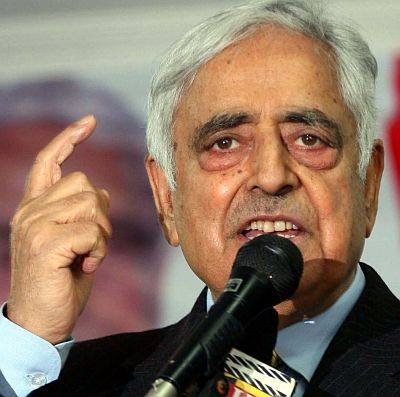 With militants repeatedly targeting telecom facilities in Kashmir, Chief Minister Mufti Mohammad Sayeed on Tuesday directed the police to ensure security of cellular towers and those manning them as some employees and franchises have stopped work following attacks and threats.
With militants repeatedly targeting telecom facilities in Kashmir, Chief Minister Mufti Mohammad Sayeed on Tuesday directed the police to ensure security of cellular towers and those manning them as some employees and franchises have stopped work following attacks and threats.
Concerned over the series of attacks on mobile phone towers in the valley, the Centre also issued an advisory to the state government, asking it to ensure security of communication infrastructure and come out with an action plan to deal with militants' threat.
The Union Home ministry asked the state government to urgently review the security situation in the wake several attacks on mobile towers and killing of people connected with the communication networks
The state government has started the exercise to identify vulnerable towers and the state police has conveyed that it is in the process of providing security to some of the vulnerable towers, mostly located in Sopore and Bandipora, official sources said in New Delhi.
The state police has assured the Union Home ministry that if need be, the police will run these vulnerable towers, they said. The Cellular Operators Association of India and
Association of Unified Telecom Service Providers of India have written to the Union Home ministry as well as the state government seeking urgent intervention, saying that some employees, retailers and franchises have stopped work following militant attacks and threats.
In the wake of the series of attacks, Chief Minister Mufti Mohammad Sayeed held a meeting with senior civil and police officers in Srinagar to discuss the situation and directed the police to provide security to mobile towers and their owners and thwart any attempt to disrupt cellular services in the valley.
The meeting came a day after militants targeted a mobile phone tower with a grenade in a downtown area of Srinagar, in yet another incident that led to disruption in communication services in the valley. The militants have targeted telecom facilities in north Kashmir over the last 10 days.
Sayeed took a strong note of the disruption of cellular networks in various parts of the Valley as he noted that mobile services have become the lifeline as these services are availed by all sections of the society, an official spokesman said.
The chief minister said people cannot be pushed into stone age as modern-day functioning in government, banking, tourism, education and other vital sectors, in particular, old-age pension and e-transfer of insurance claims and compensation to flood-affected victims were totally dependent on the internet connectivity, the spokesman said.
The advisory by the Home ministry to the state government said, "Urgent review may be undertaken to assess the extent of the threat and its fallout. Suitable counter measures, including security cover wherever necessary, may be put in place urgently to prevent recurrence of such incidents and to ensure smooth functioning of the communication infrastructure."
Asking the state government to provide a detailed action plan to deal with the situation arising out of the militant threat, the Home ministry said security is vital for ensuring smooth functioning of the communication network in Jammu and Kashmir.
Meanwhile, official sources said there was no organisation called Lashkar-e-Islam, which has reportedly claimed responsibility for the attacks on telecom infrastructure, killing of two people and threatening some cellular companies.
The police have zeroed in on those responsible for the recent attacks and arrest may follow soon. The attacks started after security agencies seized a device called ‘repeater’ from a tower in Sopore and it has been found that through this device militants were using mobile towers to run their own networks to communicate to their cadres.
Militants feel that some tower owners helped the forces to detect the device, sources said.






 © 2025
© 2025